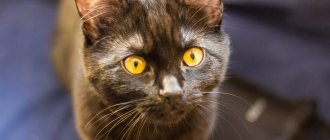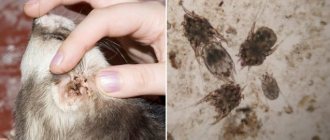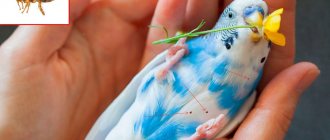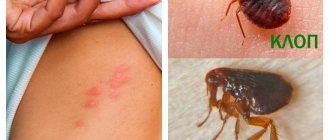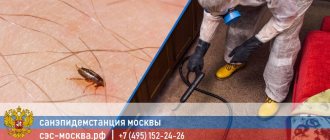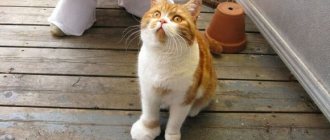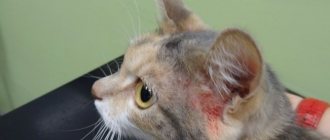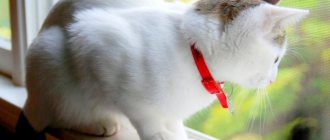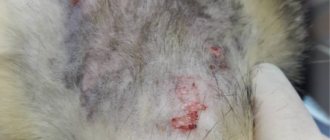Currently, it is quite difficult to find a cat owner who has never encountered the problem of protecting their pet from ectoparasites. In most cases, you have to deal with fleas. It often happens that cat owners doubt the need to prevent the insectoacaricidal threat even in pets that do not come into contact with the street. However, it is worth noting that the owner can bring flea eggs home on shoes, and this can cause the development of a population of these parasites in the house where a cat lives that has never gone outside.
The good news is that many owners understand and appreciate the need to protect their pets from ectoparasites and are taking measures to protect them from fleas, ticks and other blood-sucking creatures. The owner's choice most often falls on insectoacaricidal drops, and currently this solution is the most popular.
The bad news is that while anti-ectoparasite drops are the most suitable treatment, they also come with some risks. One of them is when a cat can lick the drops and get poisoned. And this case is worth considering in more detail.
Symptoms of flea drops poisoning include: loss of appetite, excessive salivation, dilated pupils and changes in behavior.
Yuri Lizvinsky Veterinarian, head of the training department of Apicenna LLC
Causes of poisoning with insectoacaricidal drugs
What is the reason that a product created for protection can suddenly cause undesirable consequences? Most often this happens due to the owner’s carelessness:
- The most common reason is failure to follow the instructions for use of the drug. Cat owners can give an excessive dose of drops, resulting in a fairly large drop that the cat, due to its natural flexibility, can lick off and become poisoned. Often, the owner can give an excess amount of the drug due to the fact that he uses drops in opaque packaging and simply does not see how much of the substance he sets;
- There are also frequent cases when owners, neglecting the recommendations, apply drops to places that the cat can reach;
- There is a possibility of licking off the drops if the owner has several animals and after treatment he did not take measures to ensure that his pets did not come into contact until the drops completely dried.
How to help your pet
Having noticed alarming symptoms, you need to try to alleviate the condition of a cat poisoned by flea drops as much as possible. Ideally, take the animal to the veterinarian and place it in the hands of a professional. However, this is not always possible, and it’s a shame to look at a cat. What to do in this case?
You can give the animal rice water. It is prepared by pouring one and a half tablespoons of cereal with half a liter of water and boiling over low heat for about forty minutes. The cooled and strained liquid is offered to the cat. Since he is constantly thirsty, most likely he will not refuse the medicine. Otherwise, the broth is poured inside the cat using a syringe.
Among medications for poisoning with flea drops, Smecta is used. Half a sachet of this drug is diluted with two tablespoons of water and poured into the mouth or offered to the animal as a drink. The danger to a cat can be significantly reduced by allowing the animal to lick half a tablet of regular activated carbon, crushed and dissolved in water.
It will draw out all toxins from the body. No-Shpa will help relieve the condition caused by the drops. The dose of this drug for an adult cat is also 0.5 tablets. But the intestinal microflora is perfectly restored by the prebiotic for animals “Vetelakt”. The specifics of its use are described in the attached instructions.
© shutterstock
A cat that has been poisoned by flea drops should drink more. You can add a little potassium permanganate to the water if the incident occurred recently. Fatty, salty, sweet foods are contraindicated for the animal during this period. Most likely, the cat himself will refuse such food, because his appetite is practically zero.
Symptoms of poisoning
How can you recognize that a cat has been poisoned? There are several signs that will help you suspect that something is wrong with your cat:
- Behavior change. The cat became less mobile, or, on the contrary, began to show excessive activity. There may be a lack of coordination, trembling, convulsions, lacrimation;
- Change in appetite. A cat who is not feeling well may even show apathy towards treats that delighted her when she was healthy;
- Excessive salivation. Saliva may be pulled from the mouth or foamed around the lips. In places where the cat slept, you can find a wet spot from saliva, and this can also be a sign of poisoning;
- Uncharacteristic condition of the pupils. Dilated pupils very often indicate poisoning.
Negative symptoms of poisoning
A sign that something is wrong with an animal can be its constant licking.
If a cat has ingested flea drops, then after 1/6 hour his health will worsen. The strength of the manifestation of negative symptoms varies depending on the dosage of the drug, individual tolerance of the drug and the composition of the medication. Typical symptoms that indicate the need to promptly take your pet to a doctor include the following:
- copious amounts of saliva;
- dilated pupils;
- loss of appetite;
- copious fluid intake;
- gagging;
- frequent licking of the mouth;
- red staining of the mucous membranes of the mouth, eyes, and ears;
- skin rash;
- convulsive movements of the paws and body;
- stomach upset;
- loss of consciousness;
- involuntary defecation and urination;
- plunging into a coma.
Treatment of poisoning
The most correct and effective solution if you find signs of poisoning with insectoacaricidal drops in your pet is to contact the nearest veterinary clinic. In this case, you need to tell the doctor exactly what drug you took, in what dosage and how long ago. This information will help your veterinarian quickly select the most effective treatment.
After assistance is provided, all that remains is to adhere to the doctor’s recommendations and act in accordance with his instructions. To maintain health and restore the vitality of a cat’s body, the following is recommended:
- Diet food. Most often, doctors recommend industrially produced veterinary diets, but some doctors can create a diet based on foods available to humans;
- Liver restoration. For this purpose, doctors most often recommend Hepatovet Active due to the fact that its composition is optimal for restoring and protecting the liver of cats. It is more convenient to administer a highly palatable suspension to such fastidious animals as a cat;
- Symptomatic treatment. Here everything also depends on your attending physician. If there are still signs of illness that may be bothering your cat, your doctor may prescribe painkillers or anti-anxiety medications.
First aid for poisoning with flea drops in a cat
If you see that your cat has licked off some of the drops, first rinse the animal’s stomach. The faster you do this, the easier the pet will tolerate intoxication, since most of the toxic substances will not have time to be absorbed into the bloodstream. Rinse the cat's mouth, give it water, and maybe add a little salt. The volume of liquid should be sufficient to induce vomiting.
After emptying the stomach, offer your pet a sorbent. The most common are Smecta, Enterosgel, activated carbon. These products neutralize some of the toxins, further alleviating the condition.
With timely gastric lavage and sorbent intake, it is possible to reduce the risk of acute poisoning to a minimum. After the procedures, you need to prevent further contact with the problematic substance, i.e. wash it off the skin with any cleansing shampoo with a strong degreasing effect.
If the animal has already shown the first symptoms, you should call a veterinarian at home or go with the cat to the nearest clinic. Take the package of anti-flea medication and the annotation with you so that a specialist can identify the problematic substance.
If symptoms of poisoning appear, you should call a veterinarian.
The effectiveness of gastric lavage and sorbent intake depends on how much time has passed since contact with the toxin.
If the animal has already had several bouts of vomiting, you should not force it to drink water.
How to prevent poisoning?
It is easier and cheaper to prevent any disease than to later deal with the consequences and waste a lot of money on treatment and rehabilitation measures. What to do for this:
- First of all, follow the manufacturer's instructions. Set the drug taking into account the weight of the animal. For cats, there is a solution in the form of “Dana Ultra” drops, which are produced in a transparent pipette and sold in individual packaging in a dosage for cats from 4 kg and cats up to 4 kg, which allows you to accurately determine the amount of the drug and avoid undesirable consequences;
- Apply drops to places inaccessible to the cat’s licking, namely in the withers area, spreading the fur and placing the pipette directly against the skin;
- If several animals are subject to treatment, then it is necessary to isolate them from each other until the droplets dry completely. If you need to protect your pets from ectoparasites, you can use flea collars. One of the most suitable solutions in this case can be considered the Dana Ultra collar, since due to optimally selected active ingredients, it is highly effective and safe, and also completely eliminates the entry of active ingredients into the cat’s gastrointestinal tract.
The life and health of a pet is, first of all, the responsibility of the owner. Only by choosing the optimal solutions and following the manufacturer’s instructions can you avoid unwanted consequences and protect your cat from dangers.
Permethrin
Permethrin is an antiparasitic agent. Its action is based on disruption of the permeability of Na channels in insect nerve cells. Thus, permethrin has a neurotoxic effect. It is a synthetic analogue of biological substances of the pyrethroid group, obtained from flowers of the chrysanthemum genus.
Included in drops and sprays used to treat animals.
Absorption into the blood occurs through the skin when the drug is applied, or when liquid is licked from the surface of the body.
Cats are most often affected by the use of high doses of permethrin, which is part of antiparasitic products for dogs.
Flea treatment for pregnant animals
Still from the YouTube channel “Family Lyubimets Veterinary Clinic”
If mating of a cat or dog is planned soon, first carry out a comprehensive cleansing of the animal’s body from various pests. You need to start with external parasites (fleas and ticks), then you need to deal with internal pests (worms) and get vaccinated.
When fleas are found on a pregnant or lactating pet, you need to carefully choose a product to combat parasites. A wide range of drugs, including sprays and drops with very toxic components, are strictly prohibited for use on pregnant and lactating animals. Relatively safe products for a mature pet, here they can lead to negative effects on the offspring, complicate pregnancy, and provoke a miscarriage.
The main rule when choosing a pest control product is to prevent it from entering the body (this is why tablets and injections are not suitable).
Experts recommend using anti-flea shampoo for such purposes, but it should clearly indicate the possibility of treating a pregnant animal . Strictly follow the rules set out in the instructions, thoroughly rinse the drug, dry the fur and comb your pet.
Why are dog tick and flea drops dangerous for cats?
Some anti-parasite products for dogs contain a substance that is extremely toxic to cats - permethrin. This synthetic pesticide is similar to natural compounds found in chrysanthemums. Used as an acaricidal and insecticidal agent. If the substance is eliminated quickly from the body of a dog or human, then from a cat it is very slowly.
Permethrin causes neurological disorders in cats, the first symptoms of which appear no later than six hours after contact with the animal's skin.
Signs of a cat being poisoned by a pyrethroid pesticide
The first symptoms include drooling, vomiting, disorientation, trembling and muscle twitching.- At the second stage, neurological symptoms appear: lethargy, fatigue, lack of coordination of movements, convulsions, which lead to oxygen deficiency in the brain. As a result, tissues in the brain that have not received oxygen begin to die. Irreversible damage to brain tissue occurs.
- Without veterinary care, death occurs.
Owners may accidentally confuse drops for treating dogs and cats, or they may specifically treat a cat with dog drops in order to save money. Sometimes owners purchase antiparasitic products on the Internet without studying their composition and purpose in detail. In any case, after treatment with a dangerous drug, the cat will have to be rescued, otherwise bad consequences cannot be avoided.
